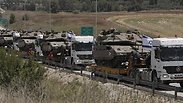
Israel's goal must be demilitarization of Gaza
Analysis: Ahead of ceasefire, IDF must demand a complete stop to rocket manufacturing in Strip or a free hand to attack Hamas' military industry. Otherwise, next round will follow very soon.
The IDF was dragged into this operation, and did not enter it as it would have wanted to. That's the reason why it lost the surprise advantage and failed to target senior Hamas members or the long-range missiles.
Initial contact for a ceasefire began behind the scenes over the weekend, likely with Egyptian or Qatari mediation. As far as the IDF is concerned, there is a basic condition which must be put on the table: A free hand to attack the offensive tunnels and the military industry which has developed in Gaza and produces the medium- and long-range missiles.
Another essential demand is that the Egyptians will continue shutting down the smuggling tunnels in Rafah, and that anyone assuming the role of mediator – whether the Egyptians or the Qataris – will be committed to try to stop Hamas from gaining strength.
The army would like to see Palestinian Authority Chairman Mahmoud Abbas as an active and leading partner in the mediation attempts, and views him as a figure which can deliver the goods, especially on the backdrop of his conduct since the abduction of the three Israeli teens a month ago.
If the mediating body is incapable of implementing the demilitarization, Israel will have to give itself a free hand in the Strip – otherwise, the IDF will find itself in another round without a very short period of time.
Since Operation Pillar of Defense almost two years ago, the number of Hamas' long-range rockets in Gaza has increased twentyfold, with hardly any smuggling from Sudan or Iran.
The IDF claims in every briefing that Hamas has grown weaker in this conflict, but the truth is – and the Intelligence Directorate knows it too – that the organization has not grown as weak as Israel is trying to convey. Until Saturday night, not a single senior Hamas commander had been hurt, even those with ranks parallel to brigade commander or regiment commander. According to estimates, for that purpose the army will need at least a few more days of intensive airstrikes.
In the meantime, about a 100 homes of Hamas activists have been destroyed in the past week as part of the "roof knocking" practice, but the effects of this move will only be seen after the current round ends.
The IDF echelon shares the same opinion that this operation will deter them from launching another battle, just like Hezbollah has been deterred since the end of the Second Lebanon War, when Hassan Nasrallah left his bunker and saw the ruins.
Saturday marked eight years since the start of that war, and on Saturday it was also decided – as part of increasing the attacks – to partially implement what has been defined as the "Dahiya doctrine" and to fire back at the same areas the terrorists open fire from, even if they are populated, but with sufficient warning to civilians.
The reason for this decision may be that the army has realized that Nasrallah is monitoring this round, and that it is basically a preview of the third Lebanon War.










